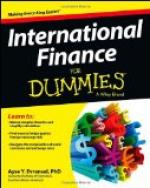When all has been said that can be urged against the record of international finance, the fact remains that from the purely material point of view it has done a great work in increasing the wealth of mankind. It is true that capital has often been wasted by being lent to corrupt or improvident borrowers for purposes which were either objectionable in themselves, or which ought to have been financed, if at all, out of current revenue. It is true, also, that crimes have been committed, as in the case of the Putumayo horrors, when the money of English shareholders has been invested in the exploitation of helpless natives, accompanied by circumstances of atrocious barbarity. Nevertheless if we compare the record of finance with that of religion or international politics, it stands out as by far the cleanest of the influences that have worked upon the mutual relations of the various groups of mankind. International Finance makes a series of bargains between one nation and another, for the mutual benefit of each, complicated by occasional blunders, some robbery, and, in exceptional cases, horrible brutality. Religion has stained history with the most ruthless massacres, and the most unspeakable ingenuity in torture, all devised for the glory of God, and the furtherance of what its devotees believed to be His word. International politics have plunged mankind into a series of bloody and destructive wars, culminating in the present cataclysm. Finance can only prosper through production; its efforts are inevitably failures, if they do not tend to the growing and making of things, or the production of services, that are wanted. Destruction, reduced to a fine art and embellished by the nicest ingenuities of the most carefully applied science, is the weapon of international politics.
Note.—The names of the actors in the Honduras drama were printed in blank because it seemed unfair to do otherwise, in revising fifty years’ old scandals, as an example of what International Finance can do at its worst.
FOOTNOTES:
[Footnote 5: Merchant of Venice, I, 3.]
[Footnote 6: Pages 75, 76. (NOTE: See Chapter IV, “In the beginnings of international trade...")]
CHAPTER VII
NATIONALISM AND FINANCE
So far we have considered the working of International Finance chiefly from the point of view of its effects upon the prosperity and comfort of mankind as a whole and on this country, as the greatest trader, carrier, and financier of the world. We have seen that the benefit that it works is wrought chiefly through specialization, that is, through the production of the good things of the earth in the lands best fitted, by climate or otherwise, to grow and make them. By lending money to other lands, and the goods and service that they have bought with it, we have helped




